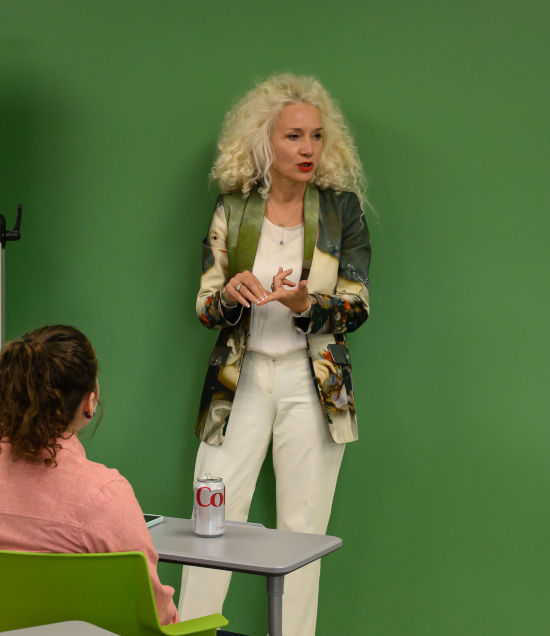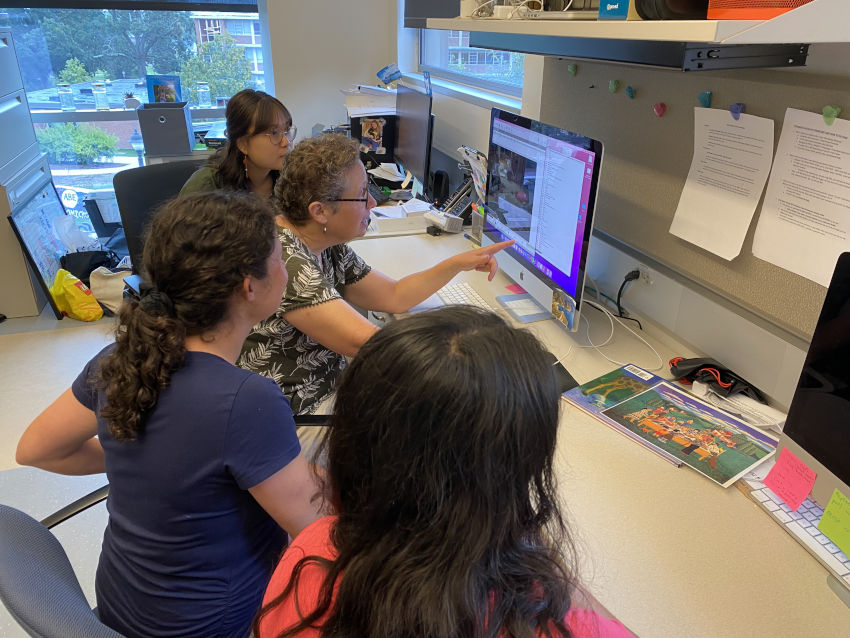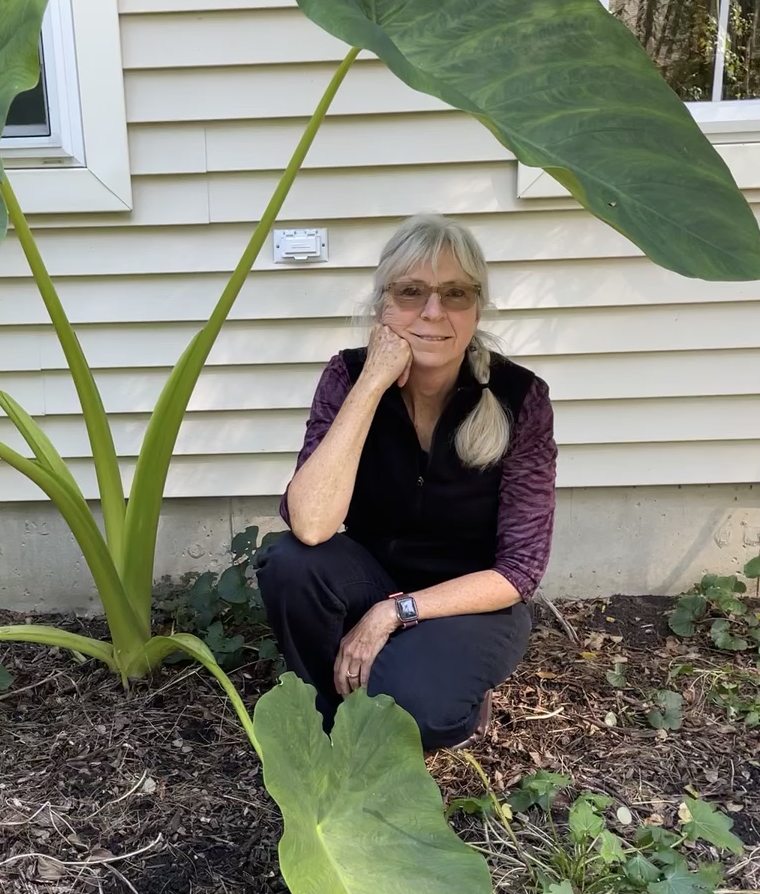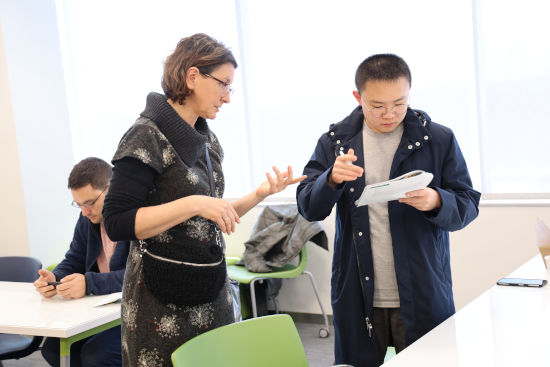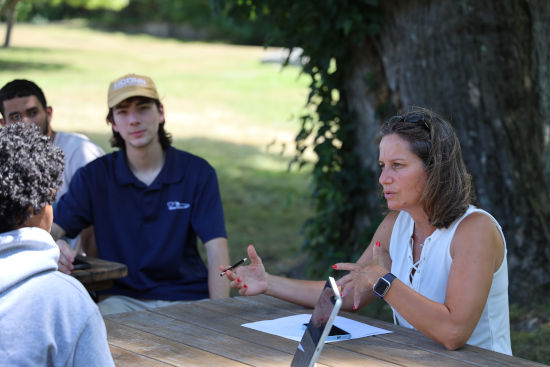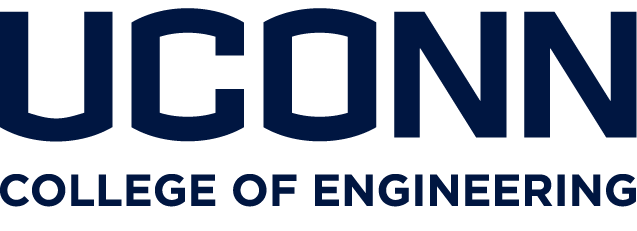Author: Jasna Jankovic named 2024 Distinguished Engineering Educator
Jasna Jankovic, Associate Professor in the Department of Materials Science and Engineering (MSE), has been recognized by the UConn College of Engineering as a winner of the 2024 Distinguished Engineering Educator Award. The DEE award is bestowed yearly on select engineering faculty for outstanding teaching and innovation at the undergraduate level.
Jankovic has been with UConn since 2018 and has been a valued member of the MSE Department. She has received a number of awards, including Provost Letter of Teaching Excellence in 2019 and 2020, and AAUP Award for Special Achievements 2021. Also in 2021 she received the prestigious NSF CAREER Award, which, besides an innovative research component, has a unique educational component using virtual reality. Jankovic recently received two grants from the Department of Energy, totaling close to $3 million. Her research group’s interests include advanced nanomaterials for clean energy, electrospinning for clean energy applications, and templating nature designs for application in clean energy.
Author: UConn Sustainability Action Plan Taking Wide-Ranging Approach to ‘Green’ Future
UConn has established a detailed plan to measure progress and achieve a wide range of sustainability goals, a commitment that President Radenka Maric describes as foundational to the University’s core values and mission.
The UConn Sustainability Action Plan delineates specific actions to achieve carbon neutrality by 2030; conserve resources; integrate sustainability across UConn’s academic and research activities; ensure equity and engagement; and establish partnerships and support innovation to address sustainability challenges.
“The Sustainability Action Plan outlines our strategic framework to cultivate a culture of environmental responsibility, social equity, and economic viability across all facets of our institution … (It) embodies our unwavering commitment to lead by example, embrace innovation, and create a resilient and sustainable future for our University and beyond,” Maric wrote in its introduction.
It complements UConn’s Strategic Plan, interweaving five key sustainability objectives with the 10-year strategic plan’s initiatives in academics, research, inclusivity, and other critical areas.
The Sustainability Action Plan’s emphasis on interdisciplinary collaborations also has inspired this month’s launch of UConn’s new ECollaboration Sustainability Network (ESN), a forum for students, faculty, and members to network, collaborate, and share sustainability-related information.
UConn Sustainability Action Plan Taking Wide-Ranging Approach to ‘Green’ Future
Author: Solar Nanodevices
Author: Sustainability Energy in Fuels
Author: Graduate Students Share Research, Network with Peers at UConn’s Sustainability Summit
Thirty graduate students shared their ongoing research during the inaugural Center for Clean Energy Engineering (C2E2) Graduate Student Research Summit in Sustainability.
The summit, held Feb. 16 and 17 at the Innovation Partnership Building (IPB), showcased the work of students from multiple disciplines in engineering. Graduate students Alanna Gado and Leila Chebbo organized and led the event.
“Graduate students at C2E2 don’t have many opportunities to practice research presentations outside of conferences and Ph.D program milestones,” Gado says. “We wanted this to be a valuable experience, where graduate students would receive feedback on their presentation skills while also networking with peers.”
The event opened with an introduction and welcome from C2E2 Director Xiao-Dong Zhou, the Connecticut Clean Energy Fund Professor in Sustainability and Nicholas E. Madonna Chair in Sustainability and a presentation from Theo Menounos, assistant director of the of the Center for Career Development and College of Engineering career readiness lead. Menounos offered tips and advice on public speaking and how to be confident when presenting and answering questions. “Theo’s presentation was very helpful,” Chebbo says. “The notes and advice he provided will be in my mind whenever I am preparing for a presentation.”
Graduate Students Share Research, Network with Peers at UConn’s Sustainability Summit
Author: UConn Students and Faculty Recognized by Nature Communications as Top 25 Health Sciences Articles of 2023
April 2, 2024 | Jordan Baker, Center for Clean Energy Engineering
UConn Biomedical Engineering Graduate Student had her paper, “Injectable and Biodegradable Piezoelectric Hydrogel for Osteoarthritis Treatment” listed as one of Nature Communication’s Top 25 Health Sciences Articles of 2023. Tra Vinikoor, who is a graduate student within\ the Department of Biomedical Engineering as well as the Center for Clean Energy Engineering (C2E2), was the lead on the paper. There were numerous contributors, two of which are also from C2E2, her advisor, Prof. Thanh Nguyen and Post Doc Somasundaram Prasadh, as well as collaborators from various disciplines across UConn’s College of Engineering and UConn Health. This paper is a part of a group of articles that were the most downloaded throughout the year and that highlight valuable research from an international community.
Their article explores alternative solutions to osteoarthritis treatment that works to do more than alleviate symptoms. Current treatments that use analgesics and anti-inflammatory drugs only relieve symptoms, but they are presenting an option that will help to heal the cartilage. They have created a biodegradable piezoelectric hydrogel which can be injected into the joints and produce electrical cues under ultrasounds to spark healing.
This treatment aims to serve as a better alternative to standard treatments and surgeries that don’t ultimately heal the damaged tissue, as well as serve as a greener option. The injectable piezoelectric hydrogel carries thousands of nanofibers that act like small batteries and self-produce electricity under the ultrasounds. These batteries are special, meaning they are safe for the body and biodegradable, promoting green energy for body healing. Long term, there is the hope to use this same approach on other tissues and organs to further promote body healing through greener options.
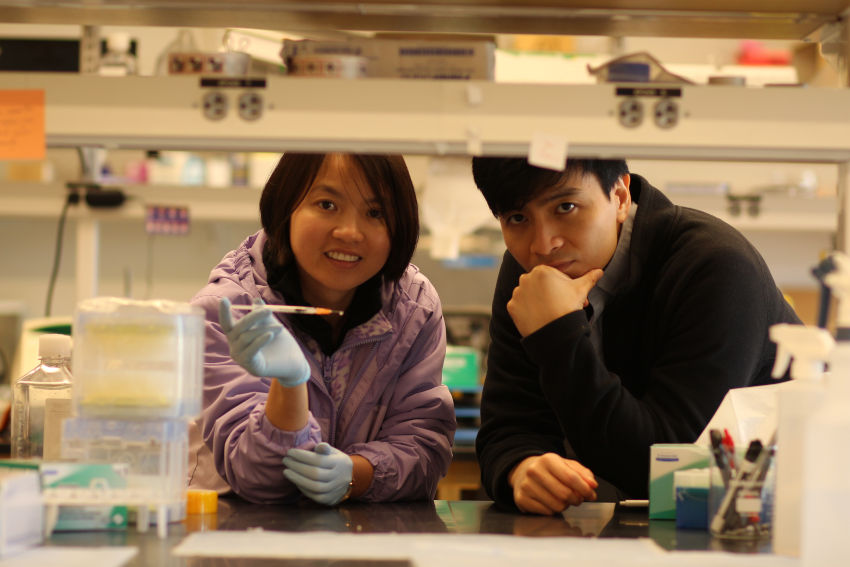
Tra Vinikoor (left) and Prof. Thanh Nguyen (right) in the lab. (Contributed photo)
Author: Gift of Fuel Cell Units Enhances UConn’s Clean Energy Commitment
The Center for Clean Energy Engineering (C2E2) is set to receive a significant gift that will contribute to UConn’s goal of carbon neutrality.
InfraPrime – an international company that empowers its clients to reach carbon neutrality goals, and eventually carbon negativity – is donating eight solid oxide fuel cell (SOFC) units to UConn. The units are versatile in their fuel choices, capable of directly generating electricity at a high efficiency from a variety of fuels, including hydrogen, ammonia, hydrocarbons, and biomass. When operating reversibly, those units can be used to produce hydrogen from water or convert CO2 to fuels.
Each individual unit is roughly the size of a dishwasher. Once delivered, they will be installed at C2E2 on the Depot Campus and at the Engineering Science Building at UConn Storrs to offer advanced research and training opportunities for UConn faculty members and students.
Gift of Fuel Cell Units Enhances UConn’s Clean Energy Commitment
Author: UConn Awarded $4.5M DOE Grant to Benefit Grid Reliability for Transmission and Distribution Systems
A project spearheaded by the University of Connecticut will help power grid operators nationwide revolutionize how renewable energy sources are integrated into the electrical grid.
On March 19, the Department of Energy awarded Lead Principal Investigator, Associate Director of the Eversource Energy Center and Assistant Professor of Electrical Engineering Zongjie Wang with a $4.5 million grant ($3,340,168 DOE and $1,127,191 awardee costs share) to pursue this groundbreaking initiative, which focuses on developing a new “TRANSFORMATIVE” tool that will make significant improvements in power grid efficiency, reliability, and resilience to bounce back from disruptions, like severe weather events.
UConn Awarded $4.5M DOE Grant to Benefit Grid Reliability for Transmission and Distribution Systems
Author: Center for Clean Energy Engineering
Author: Forecasting Wind Energy
Author: Research Experience for Undergraduates Program
Author: UConn STEAM Solar Tree
Author: PEARL Research Lab
Author: CCAST-3D Printing Membranes
Author: “You Are Who You Believe You Are”; UConn’s Women in STEM are Creating Visibility for Younger Generations
Author: Matheou’s Art, Inspired by Fluid Dynamics, on Display at National Academy of Sciences
Clouds strongly interact with solar radiation and as a result small changes in cloud cover have big impact on the Earth’s surface temperature. Currently, the effects of clouds are one of the largest sources of uncertainty in climate projections.
Recent computer technology, however, is enabling scientists and engineers to create cloud simulations in controlled environments.
Georgios Matheou, associate professor of mechanical engineering in the School of Mechanical, Aerospace and Manufacturing Engineering, is using a mathematical model called large-eddy simulation to replicate cloud physics and create cloud models. These simulations help improve weather forecasts and climate projections while contributing to the field of fluid dynamics—a discipline that describes the flow of liquids and gases.
Matheou’s Art, Inspired by Fluid Dynamics, on Display at National Academy of Sciences
Author: Plug Power VP Inspires Engineering Students and Faculty with Talk on Decision Making in Corporate Research
January 13, 2024 | Jordan Baker, Center for Clean Energy Engineering
On Friday February 2nd, Dr. Cortney Mittelsteadt presented a talk to UConn engineering students and faculty within the Center for Clean Energy Engineering (C2E2). Mittelsteadt who worked with Giner Inc, and later became CEO before becoming the Vice President of Electrolyzer Technology for Plug Power, shared stories of his work with various industry companies such as General Motors (GM), NASA, and the Department of Energy (DOE).
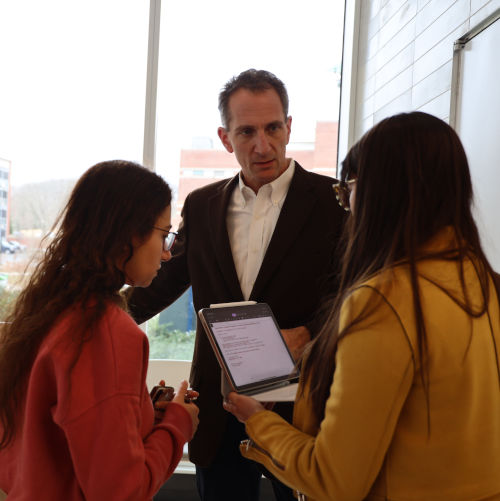
Dr. Cortney Mittelsteadt talking with graduate students after his talk in the Engineering Science Building. (Jordan Baker/UConn photo)
His talk, which prompted many questions from students and faculty, discussed the importance of decision making in corporate research and development while also providing examples of his own career in hydrogen fuel cell and electrolyzer technology. The talk gave students, both undergraduate and graduate, insight into what a career as a PhD scientist can look like outside of academia. He gave examples of projects that he worked on with GM, NASA, and the DOE while also sharing the technological issues he faced within these projects.
His examples provided insight into the exciting careers working in the hydrogen fuel cell industry and general knowledge of the business side in the industry. The technological and business challenges that he dealt with included technical issues with materials and large-scale fabrication, lab space expansion, funding limitations, competitive world of business, to name just a few. He showed the strength that an image or an “easy” story can have, while emphasizing the fact that there needs to be science and research behind it.
Mittelsteadt is now the Vice President of Electrolyzer Technology for Power Plug, an industry company that has a strong history of collaboration with UConn for several years. Dr. Jasna Jankovic, a faculty member within C2E2, said of the talk, “We are happy to host Dr. Cortney Mittelsteadt here at UConn. He brings immense knowledge and experience in both technical and business side of hydrogen technologies. We have been collaborating with Dr. Mittelsteadt and Plug Power for many years now, and they have always been great partners to UConn, supporters of our initiatives, and mentors to our students.”
UConn and Plug Power have had a strong history of collaboration between faculty and students alike. Dr. Mittelsteadt’s talk was a powerful addition to this relationship. Mariah Batool, a graduate student within the Materials Science and Engineering Department and C2E2, said of the talk, “Dr. Mittelsteadt highlighted the hurdles and gaps between the inception of research ideas, large-scale production considerations and process of securing financial backing. It was reassuring to see that despite numerous challenges, with passion, commitment, and hard work, Plug Power continues to make remarkable progress and demonstrate excellence in leading Proton Exchange Membrane (PEM) technologies. The ongoing collaboration between UConn and Plug Power, offers promising opportunity to graduate students to expand their knowledge, learn from one of the market’s leaders of PEM technology, and foster strong academic-industry linkage.”
The faculty and students in attendance received an inspiring story of challenges and solutions in the growing field of the clean energy industry. These stories will help aid students (and even faculty) in their own careers and motivate them to continue to foster their passion for the science and push through any challenges.
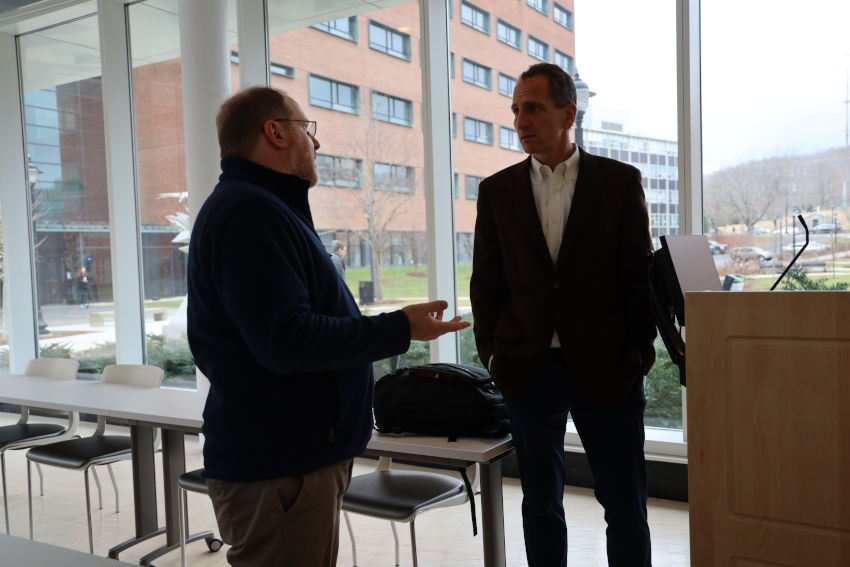
Dr. Cortney Mittelsteadt talking with faculty member Prof. Jeff McCutcheon (Jordan Baker/UConn photo)
Author: UConn Graduate Student Awarded 2023 NASA CT Space Grant Consortium Graduate Research Fellowship
January 10, 2024 | Jordan Baker, Center for Clean Energy Engineering
Graduate student, Alanna Gado, has recently been awarded the NASA CT Space Grant Consortium Graduate Research Fellowship. Gado, who is a graduate research assistant within the Department of Chemical and Biomolecular Engineering, as well as a member of the Center for Clean Energy Engineering (C2E2), has recently been awarded this fellowship of $10,000 for her project, “High Efficiency and High Durability Proton Exchange Membrane Water Electrolyzers for Hydrogen Production with Advanced Catalyst Coated Membranes.”
Her research focusses on developing an efficient and durable perfluorosulfonic acid (PSFA)-free proton exchange membrane (PEM) water electrolyzer with a low hydrogen crossover. Reduction strategies are needed to keep the hydrogen level below the flammability limit to improve the safety of PEM water electrolyzer. Gado plans to use a hydrocarbon membrane with a dual platinum recombination layer to achieve better thermal and mechanical stability. This will help to minimize hydrogen crossover and ensure safety, efficiency, and durability.
With her research, Gado hopes to show the variety of applications that electrochemistry has. “Typically, we hear about the environmental benefits of electrochemical systems like fuel cells, electrolyzers, batteries, etc. over traditional combustion systems. Electrochemistry is cool because it can also be used in self-sustaining systems, like in space exploration.” Gado said. This is where her research comes in to play where her plans to develop a PEM water electrolyzer, will help support space exploration and NASA’s Space Technology Mission Directorate (STMD), which is a constituent of the NASA CT Space Grant Consortium fellowships. “Alanna is applying the technology base that is currently available and for commercial products on earth and adjusting the design so that it meets the requirements of space”, Leonard Bonville said of Alanna’s research, highlighting the vastness of electrochemistry and its uses to help the environment.
Not only does her project support the initiatives of NASA’s STMD, but it works to supply solutions to global problems about climate change and sustainability while also applying them to space. Her advisor, Dr. Radenka Maric, said of her work, “Bringing highly efficient and environmentally sustainable fuel cell technologies to space applications is so important for our future. Alanna is a hardworking problem solver, and she likes technical challenges. The NASA project reflects her commitment to addressing tough climate change problems through clean energy technologies. I look forward to supervising her work on this project.”
Gado began her work in December 2023 and will conclude in June 2024. She began preparing for her project by reading literature that will aid in her research. Gado will be conducting her research at C2E2 with technical support from her advisors Dr. Radenka Maric and Mr. Leonard Bonville.
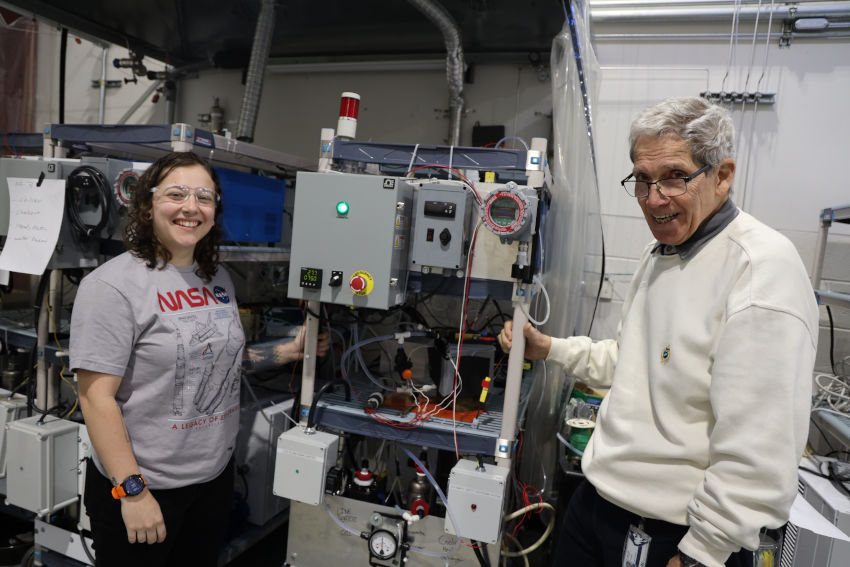
Ms. Alanna Gado and Mr. Leonard Bonville working at the Center for Clean Energy Engineering.(Terry Barber-Tournaud/UConn photo)
Author: UConn Adopts Ambitious 10-Year Strategic Plan
UConn has launched the steps to implement a far-reaching 10-year strategic plan built on the pillars of promoting holistic student success, expanding the University’s research impact, and using its strengths to help Connecticut thrive.
The new plan, which goes into effect next year and covers the period through 2034, includes six initiatives to support those pillars and 30 priority actions. It is student-centered at its core, organizers say, while also promoting investment in UConn’s research enterprise and prioritizing fiscal responsibility and stewardship of resources.
It also includes four key performance indicators (KPIs) for which UConn will strive, with many others to be added in 2024 to achieve the specific initiatives named in the plan. The four KPIs, as identified by President Radenka Maric, are:
• Reach and consistently maintain a six-year graduation rate of 90% or more. Currently, about 83% of UConn’s students graduate within six years. While that is notably higher than the national average of 62.2%, it ranks 25th among public universities.
Author: UConn Earns High Marks in Global Sustainable University Ratings
UConn was ranked as the 9th most sustainable university in the world by UI GreenMetric, an international sustainability scoring system that reviews over a thousand educational institutions.
GreenMetric ranks higher education institutions based on six categories: settings and infrastructure, energy and climate change, waste, water, transportation, and education and research. There are 1,050 universities from 85 countries that participate. It was founded in 2010 out of the University of Indonesia.
UConn also ranked as the second most sustainable university in the country, beat by only the University of California, Davis, which charted at number five globally. Worldwide, the most sustainable institutions are Wageningen University in the Netherlands, Nottingham Trent University in the United Kingdom, and Umwelt-Campus Birkenfeld in Germany.
UConn Earns High Marks in Global Sustainable University Ratings
Author: UConn’s Growing Research Strength Reflected in HERD Survey Rankings
UConn’s rankings have leapt in the National Science Foundation (NSF) survey that measures colleges and universities according to their expenditures in research and development.
NSF’s Center for Science and Engineering Statistics surveyed more than 900 schools across the country that spent more than $150,000 in research expenditures during the 2022 fiscal year. The data are compiled into the annual Higher Education Research and Development (HERD) Survey.
In the most recent survey, UConn jumped to 79th in overall expenditures, moving up nine spots from 88th in the 2021 fiscal year. The University’s total research expenditures in fiscal year 2022 increased more than $64 million over the previous year, hitting a record $367.6 million invested in research and development.
UConn’s Growing Research Strength Reflected in HERD Survey Rankings
Author: Microalgae for Poultry Nutrition: UConn Researchers Receive NSF Future Manufacturing Grant
Ateam of UConn researchers is developing a natural alternative to produce an essential amino acid used in poultry feed with support from a $500,000 grant from the National Science Foundation’s Future Manufacturing initiative.
The team is led by Mingyu Qiao, assistant professor of innovation and entrepreneurship in the Department of Nutritional Sciences in the College of Agriculture, Health and Natural Resources (CAHNR). The team includes three faculty members from the Department of Chemical and Biomolecular Engineering: Yu Lei, centennial professor, Yongku Cho, associate professor and Burcu Beykal, assistant professor; and two other faculty members within CAHNR: Yangchao Luo, associate professor of nutritional sciences, and Rigoberto Lopez, professor of agricultural and resources economics.
This project is also in collaboration with Patrick Heidkamp, professor of environment, geography, and marine sciences at Southern Connecticut State University.
This marks the first time UConn has received this grant and is Qiao’s first grant since joining the UConn faculty earlier this year.
The group will develop a novel biomanufacturing technique to produce an essential amino acid called methionine (Met).
Microalgae for Poultry Nutrition: UConn Researchers Receive NSF Future Manufacturing Grant
Author: Chih-Jen (Jackie) Sung receives the 2024 AIAA Energy Systems Award
Prof. Jackie Sung was awarded the 2024 AIAA Energy Systems Award for his significant contribution in the broad field of energy systems, and specifically for his outstanding contributions to flame dynamics and low-temperature chemistry for developing fuel-flexible, ultra-low emission, efficient combustion energy systems using conventional and alternative fuels.
He will be recognized during the 2024 AIAA SCITECH Forum, 8-12 January 2024 in Orlando, FL. The prestigious award is sponsored by the AIAA Terrestrial Energy Systems.
Author: UConn Students to University: Divest From Fossil Fuels. ‘Climate Change is Here.’
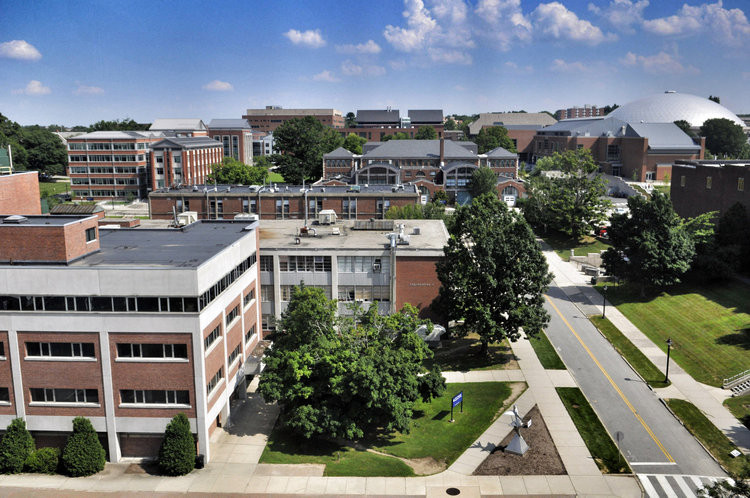
STORRS 07/18/13 View of the UConn campus. MARK MIRKO|mmirko@courant.com
After obtaining more than 1,000 online signatures of support within two weeks, a group of students at the University of Connecticut pleaded with university officials to commit to a plan for divesting from fossil fuels and work toward decarbonizing the campus.
“Our continued dependence on fossil fuels for our energy needs … directly undermines our human rights mission and university mission statement — more broadly — by denying members of our global community their right to a safe and healthy environment,” Nell Srinath, a senior political science and journalism student, said at the Board of Trustees meeting this week.
“The university mission statement states the goal of enhancing social, economic, cultural and natural environments of the state and beyond. I hope you realize as well that it is impossible to fulfill these commitments if we’re not fully doing our part to eliminate carbon emissions.”
Download full article | View Full Original Hartford Courant Article
By Jessika Harkay | CT Mirror
PUBLISHED: September 28, 2023 at 6:45 a.m. | UPDATED: September 28, 2023 at 2:15 p.m.
Author: Action-oriented Symposium Connects Researchers to Encourage Collaboration for a Sustainable Environmental Future
Climate change is the biggest challenge humans have faced, and complex issues require collaboration and diverse solutions now. To foster the partnerships and action needed for a sustainable future, UConn researchers convened to share their expertise in the Securing a Sustainable Environmental Future Symposium in October.
Ashley Helton, symposium co-lead organizer, deputy director of the Institute of the Environment, and associate professor in the Department of Natural Resources and the Environment, explains that the idea for the symposium came together when deans from the College of Agriculture, Health, and Natural Resources, the College of Liberal Arts and Sciences, and the School of Engineering met with the leadership of the Institute of the Environment and Distinguished Research Professor in the Department of Ecology and Evolutionary Biology and Emeritus President of the Cary Institute of Ecosystem Studies, Gene Likens, and they collectively realized the need to promote more collaboration for action.
“Together we decided that a symposium highlighting faculty members from across the University, existing research, and the potential for interdisciplinary collaboration across the colleges in the realms of environment and sustainability would be a good idea to explore at this critical juncture for humans and Earth,” she says.
